"Space is big. You just won't believe how vastly, hugely, mind-bogglingly big it is. I mean, you may think it's a long way down the road to the chemist's, but that's just peanuts to space." –Douglas Adams, The Hitchhiker's Guide to the Galaxy
To a race that simply Can't Sit Still (read: humans), the appeal of a limitless expanse of the unknown and unexplored is straightforward: more places to go, more things to experience... But where computer games are concerned, being in space always used to come with a caveat. To enjoy it, you had to shoot asteroids, blow up a Death Star, save Lylat from a mad scientist, beat down some Shivans, outlive necromorphs, or – indeed – put a stop to The Reaper Threat. For a place that was supposed to be limitless, it came with an awful lot of strings and rails. Everyone was telling you what to do.
It took Joel Manners' Wing Commander: Privateer and David Braben's Frontier: Elite II, in 1993, to show people what space was truly about. You could go anywhere and while you couldn't do anything you wanted, what you did was entirely up to you.
The open-world space sim was born.
Not many followed, and even fewer were memorable or good, so my path to today's review was a well-trodden straight line. Say it with me: Frontier: First Encounters, Privateer 2: Darkening, Freelancer, X3:Terran Conflict, X3:Albion Prelude and – presently – X4:Foundations (with its three expansions: Split Vendetta, Cradle of Humanity and Tides of Avarice).
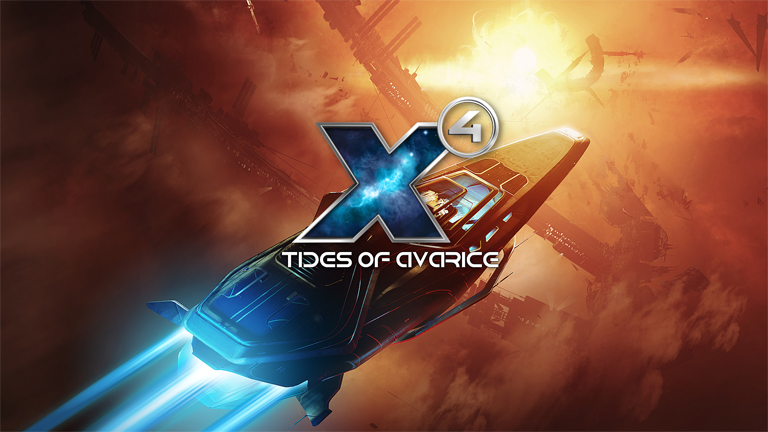
Like all of the games before it, X4 promised a vast, complex game world you could approach in Any Way You Wanted. And, like all of the games before it (save for, possibly, the two Frontier games), it failed to do so in The Exact Same Way... But let's start with what it got right (which, unlike open-world space sims on PC, is not a short list).
If you are not acquainted with Egosoft's X world, the general premise (as of X3:TC) is that humanity ran away from the Xenon: AI controlled terraforming machines who went a little Skynet and decided that, while they were redoing the galaxy's wallpaper, they'd "fix" their creators as well. While legging it from the terraformers, Some Stuff Happened and the gate network humanity was using to hop from system to system crashed, leaving it isolated from Earth in a distant corner of space.
Not alone though, as luck would have it, but in the company of four alien races: the greedy Teladi (space-lizard bankers), the overzealous Paranid (militant religious fanatics), the irritable Split (short-tempered carnivores), and the curious Boron (scientifically inclined fish). The humans who left earth (now called the Argon) settled uneasily among them and (because Egosoft is a German dev, I guess) Started Doing Business (if this was a Chris Roberts production, I guarantee you would be fighting everybody and, somehow, still Saving The President or Repelling Space Communists).
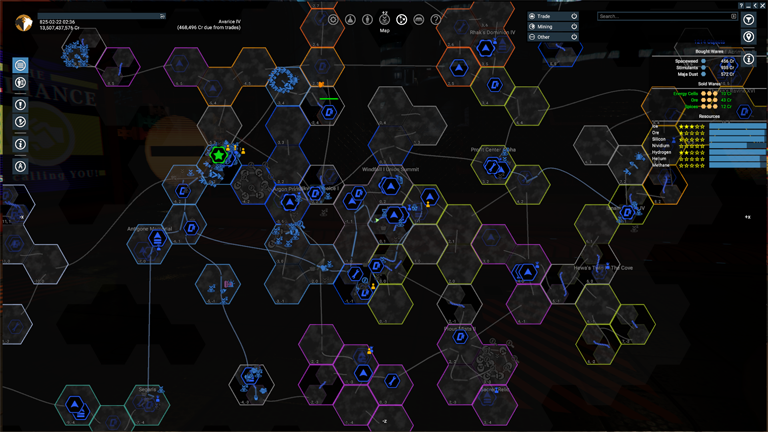
At 84 systems (with up to 3 sectors per), 5 races, 22 factions, over 80 different ship types, and the ever-expanding Xenon threat, X4 makes for a decent-sized sandbox to play around in (let's just say my playthrough has time logged in Actual Weeks); and offers Things To Do in sufficient variety to keep open-world space sim players entertained for a good, long while.
When starting a new game, you pick a starting scenario (basically your character's background, which comes with varied ships, amount of credits and equipment). As of patch 4.10, you can also create a "custom start", which lets you pick your character and starting conditions for yourself.
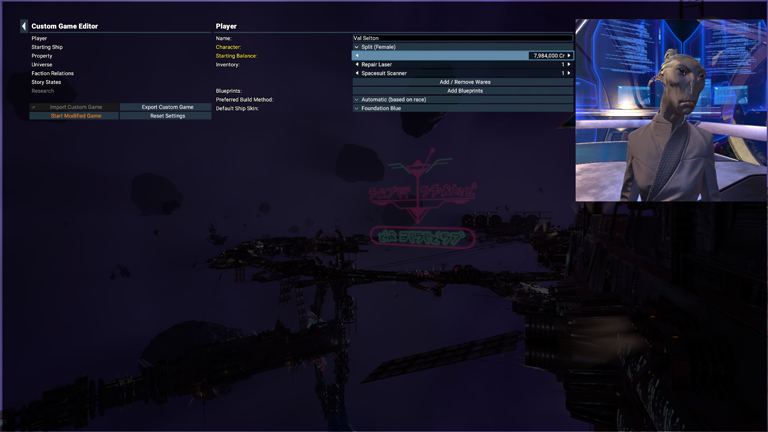
As in X3, the game also unlocks new starting scenarios as you progress through the game (there's only two, this time around), which I always found odd. In a game where a single playthrough can last Actual Months, a slightly different way to start it is (in my opinion) insufficient incentive to Actually Start Over. There's ways to unlock all starting scenarios from the outset, however, so it's not much of an issue.
When you begin a new game, you are given a single ship, some cash and varying degrees of direction. Some starts offer tutorials – others throw you in at the deep end.
For X4, Egosoft made the debatable decision to retain the 1st person walking element (which they introduced in X:Rebirth). It's a nice gimmick, which gives you a proper sense of scale, but has a couple of issues.
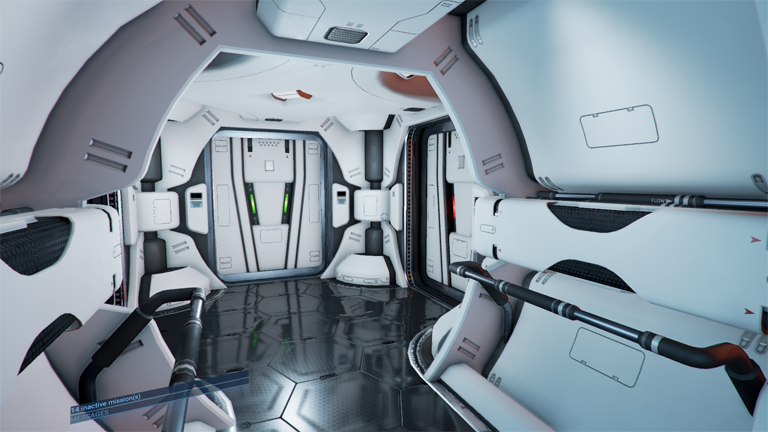
First, with every station using recycled assets for all the places you can go, you're never actually walking anyplace interesting or new. Second, the sense of scale only works with M-class ships you can actually walk up to, and then only until you board the ubiquitous elevator that brings you onto the bridge. For the huge L and XL ships, you don't even get to do that much and might as well teleport onboard. Only small fighters can be boarded directly, which – while neat – doesn't really do anything for the gameplay.
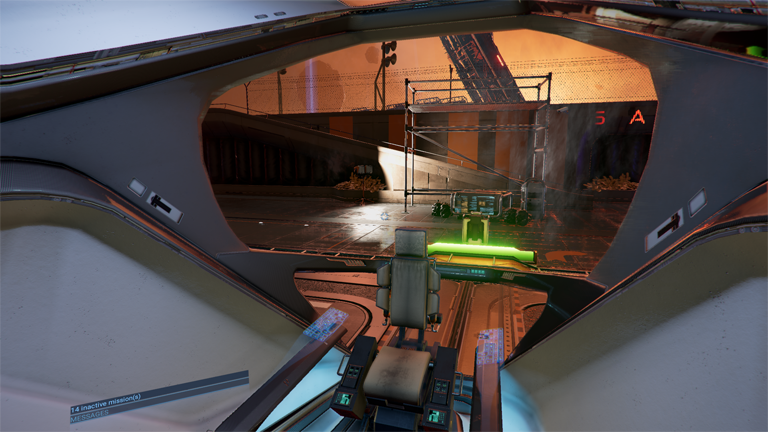
Cockpits with chairs for you and your crew are also a nice, if hollow, touch. Nice, because it's gratifying to see the crew you hired sitting next to you. Hollow, because – for a given faction – there may be a dozen different ships, but only 3 cockpits between 'em (fighters get one, M-class ships another, L/XL ships the third). No matter what you fly, you will always be seeing a slightly altered version of a basic cockpit template.
Ship design is more modular in X4 than in any of the previous installments, which – again – is a mixed bag. On the one hand, being able to pick components for your vessel and see them visually distinct on screen is very appealing. On the downside, though – as (guns aside) most components are simply different-colored versions of the same model – even the cooler-looking ships end up being overly similar at either end. Buying (or building) an aggressive wedge of a fighter and then having the same components on it as your space-taxi somehow cheapens the experience.
Every ship component can be upgraded, using one of a myriad blueprints, each of which has its good and bad points (for instance, an upgrade may increase your engine's straight-line acceleration, but lower your turning speed). This is a great addition and allows you to truly personalize a ship for how you want to use it. Want a dedicated scout? Upgrade its hull to increase radar radius. Want to while away your days smuggling? Cloak your cargo from sector police's prying eyes.
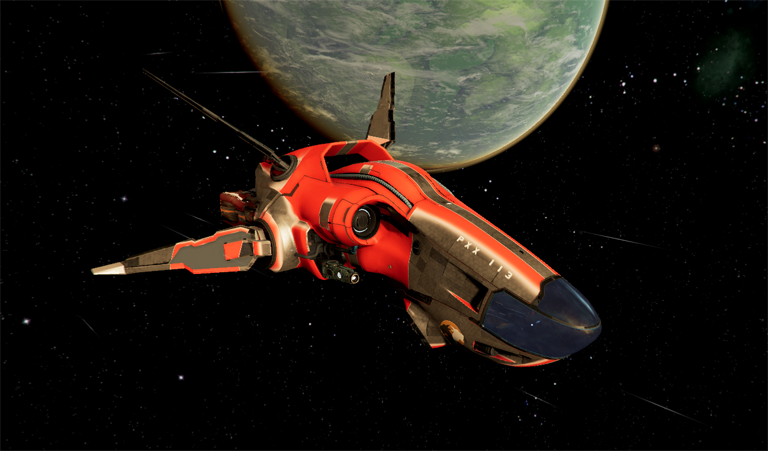
Ships are also slightly more — boring than in previous X-stallments. Funnily enough, I think Rebirth had the coolest ship design (which is ironic because could pilot exactly none of them); with X3:TC a close second. In X4, a lot of concessions had to be made to allow the modular ship layout, leaving a lot of designs resembling each other. By Split Vendetta, Cradle of Humanity and Tides of Avarice, Egosoft got the hang of the system and has since made some Nice Looking Ships, but the progress has made a lot of the earlier models look all the more dated (which, at least partially, Egosoft has started to address with new models of existing ships in patch 5.0, if I remember correctly).
Flying is still handled via a more realistic, Newtonian model (things take time to accelerate and slow, and changing your vector does not completely eliminate existing inertia) and is about as much fun as it's always been (I know games like Privateer or Freespace weren't realistic, but I always found the arcade space flying more enjoyable).
Things To Do in X4 fall broadly into: 1) trading and mining, 2) missions and 3) Plots (ranked least to most interesting).
Trading, while a staple of Making Money, boils down to keeping tabs on stations and selling them what they need, when demand is highest. Mining, on the other hand, is tantalizing until you find out how little your hours of work are actually worth. Thankfully, you can hire pilots to do both for you, behind the scenes, as it were, for a steady (if slow) source of profit. There's slightly more to both than my description may imply, but neither is more interesting for it.
What is exceedingly intricate is X4's dynamic economy, which has stations buy and use goods during the course of the game. It makes for a more dynamic market to deal with (for players who like that sort of thing), but is not without its downsides. Trying to buy a ship only to be told a shipyard is out of parts is about as much fun as playing a Long Line at the Grocery simultator. We have supply shortages in real life now. For my own part, I could have done without 'em in my entertainment as well.
Missions offer a little more variety, but their overall pool isn't so big that repetition won't become a problem. Oddly, even less emphasis is placed on combat in X4 and what few missions are available either amount to piracy (which is illegal and will lower your reputation with a given faction), or pit you against a faction's property (which amounts to the same thing). The days of carefree Xenon bashing for hundreds of thousands of credits or racking up exorbitant sums for pirate hunting are long gone, for some reason.
Also gone is asteroid scanning, which (odd as it may sound) was one of the highlights of X3:TC for me. With a fully stocked Kestrel and a few adjacent asteroid scanning missions, you could make millions in minutes (rather – you had to, since the missions were timed). In X4, asteroid scanning is still a thing, but more of a chore and infinitely less profitable.
Still, from cargo deliveries, transporting people who Missed Their Ride, disarming (or planting) mines, shooting criminals near stations, reclaiming ships, helping ships out of mine fields, to building stations, or helping a faction war some other faction (though, again, mostly logistically), there's enough to do to keep you entertained. Just don't expect combat on the scale (or pace) of Freelancer (or even X3).
Finishing missions improves your standing with the game's factions. Improving them enough will net you rank and, eventually, access to better equipment, blueprints and discounts. It's a serviceable mechanic that makes you think twice about double-crossing a faction in favor of a quick credit.
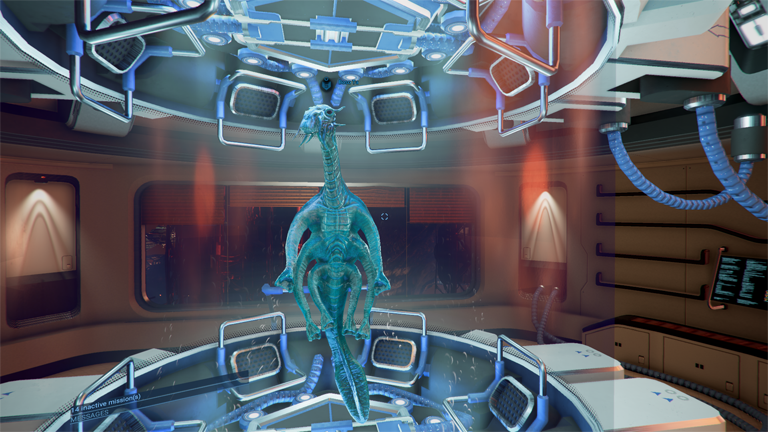
The Plots (of which there are several) offer the most involvement in the game. Ranging from small and insignificant to the galaxy-altering, all are well written, clever and (contrary to cliché) sometimes hilarious. The lead characters are interesting and well-spoken, the missions involved are distinct, bordering on unique, and, yeah – okay – the rewards are still mostly underwhelming (which is something of an X staple), but a few of them will surprise you. Uniting the Paranid, for instance, is a quick, surefire way to rid their corner of the galaxy of any and all Xenon (not even advanced AI can resist the wrath of religious conviction, it seems).
The only problem is that, to complete most plots, you will need to play the game The Way Devs Want You To Play It (i.e. build a massive industrial empire that can generate hundreds of millions in profit). Which leads us nicely to the biggest problem with X4:Foundations and all of the games that preceded it. Namely: designer bias.
With the exception of the Frontier games (which, perhaps thankfully, weren't complex enough to entertain it), every successive game in the genre has leaned hard into their creators' prejudices while, simultaneously, touting themselves as truly "open world".
For Privateer and Freelancer, the bias was combat.
While Privateer offered you four ships to choose from, by the end – when you were facing multiple opponents at every nav point – few people were flying a Galaxy or an Orion. And while trading could net you a fortune in Freelancer (like running diamonds from Freiburg to New Tokyo), doing so in a cargo ship was suicide (what with your multiple turrets all requiring manual input, which you couldn't do without leaving your ship flying a straight line). In Privateer: Darkening, you couldn't even own a cargo ship (though you could hire them out, mostly for the masochistic joy of watching your money explode).
X3:TC and X3:AP let you get by on combat for a while, but – eventually – required you to fall in line with Egosoft's bias: empire-building and construction on a massive scale. Without giant factories producing hundreds of thousands units of ore, or microchips, or what-have-you, you simply could not Progress In The Game.
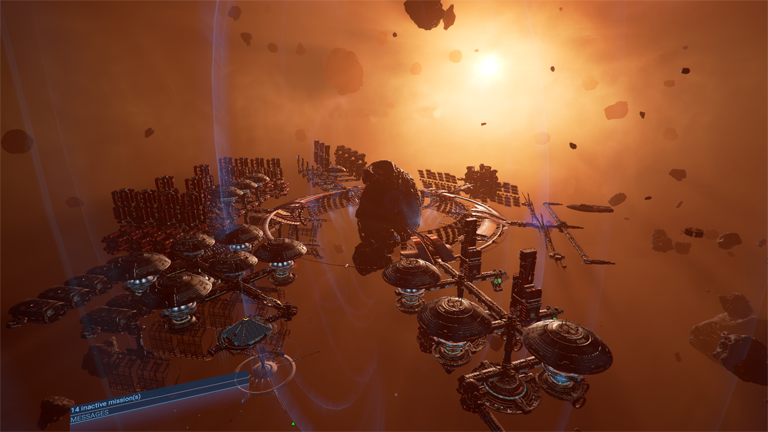
And X4 is, in the end, a glorified station construction, empire building sim set in space. There's space ships you can fly, sure, and lots of little distractions to keep you entertained (I can spend hours just interviewing and hiring crew; I don't know what it is about the process, but I find it highly addictive); but if you don't expand your business, build stations that provide resources, and Play The Way Devs Wanted You To, you can't progress in the game. Which kinda makes it an "open-world space sim" in the same way a Ford T-Model could be bought in any color of the rainbow (so long as it was black).
Technically, X4 is a marvel. From the outset, you are one moderate load time away from a seamless galaxy, where you can transition from being on foot, to being in your ship, to being in space and back again instantly.
The variety of Things To Do is also, let's say, sufficient without being overwhelming. And the art is nice, though definitely slanted more in favor of things than people (Egosoft makes some good-looking stations, spaceships and starfields, but their characters could definitely use more work).
The UI, while still not completely intuitive, is much improved from X3, the sound design and voice work is solid, the writing – consistently good – and the gameplay involving, if a bit utilitarian. You can customize and build your own ships, terraform worlds, experience unique, gorgeous systems, have a lot of semi-realistic fun EVA-ing around in space... But to do any of it, you have to play the game A Certain Way, which – to this pig, at least – sure seems like a rail, or a string, tugging your "open world" buggy to go a certain way.
Still, where offline, kinda-open-world space games are concerned, X4:Foundations is the most advanced thing out there and, if you can get past not being able to Do As You Like, offers months of "enjoyment" (if building things, trading and managing supply shortages bring you joy). The dynamic economy and myopic focus on money, resources and construction kind of get in the way of the sheer joy of Being In Space, but if you can get around it (by liking it, obviously, but also via a liberal application of mods – which X4 calls "extensions"), there's some really nice moments to be had here.
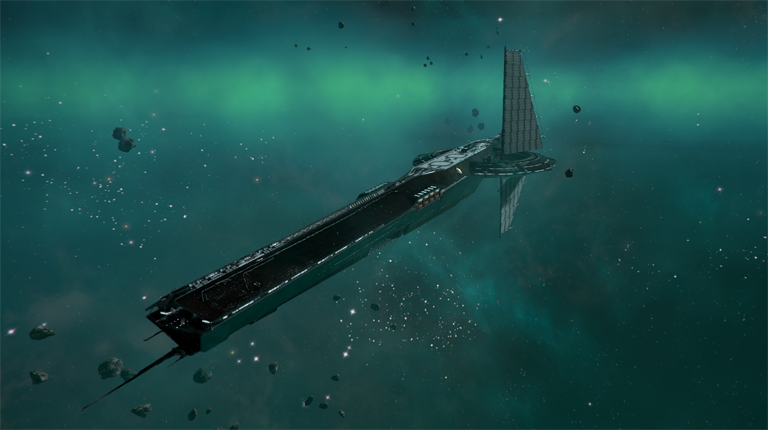
Egosoft has announced that they are not quite done with X4, with a progress update due by the end of 2022. And although I do not like everything about their game, I still like enough of it to be excited by the news. I will await it eagerly on the bridge of the Peace of Mind: the immodestly-sized Honshu auxillary I've painted gold and use as my private yacht ('cause – c'mon: it's got a sail).
Playing X4 Egosoft's way may not agree with me — but running a space empire is not without its benefits...
Extension List:
Warning: using these will tag your game as "modified" which will prohibit you from using X4's online component (which I didn't mention in the review because – meh).
-
Data Vault Logbook – places a nav-beacon next to every Data Vault in the game (they're not mandatory or remotely useful, but I'm a completionist);
-
ehtschu123 Cheat Mod 1.0 and slan_cheat – I forget which is which (one was for the original game, one updated options for Split Vendetta), but they give you access to a handy, dandy cheat menu for times when, say, you don't feel like finding x-amount of stuff to deliver for a mission (or just don't feel like dying);
-
paintjobsforsale, RareModpartsSold, ShipTradersSellPaintMods – for convenience, these mods add paintjobs and mod parts for sale at ship dealers and commodity traders;
Pig Recommends:
-
Frontier: Elite II and Frontier: First Encounters – their graphics may be dated, their physics a bit unforgiving, and their autopilots sporadically suicidal, but these two little gems got the ball rolling for all open-world space sims and their gameplay still holds true; the first Frontier is a more bare-boned sandbox, while Encounters offers some scripted missions and a bit more of an overarching plot;
-
Wing Commander: Privateer – a cross between a space sim and a noir pulp novel, Privateer still stands alone where world-building and style are concerned; in 29 years since its release, there has simply been nothing like it (sadly, this includes Righteous Fire – it's own expansion that didn't quite improve upon the original); the plot is a little hackneyed and the characters somewhat caricature-ish, but – in terms of open-world gameplay in space – it is second to none;
-
Freelancer – while its single-player campaign is a bit of a dumpster fire (travel light-years away from Earth to join a secret special forces organization to battle body-snatching aliens and Save The President; no – I am not making it up), Freelancer makes for brilliant co-op multiplayer where you can (thankfully) ignore all the "plot" rubbish and just fly around, (try to) trade, and fight; it's not without its quirks (for one thing, every ship in the game flies at the exact same speed), but makes for great fun with a friend;
-
X3:Terran Conflict – buried beneath a UI that is cryptic and overly complex is a great, expansive game that offers many serviceable plots, hidden unique ships to discover and board, and end-game scenarios on an unparalelled scale (want your own star system? it's one of the rewards); on the downside, completing said scenarios (without cheating) can take ages; X3:Albion Prelude expands the economy a bit, introduces open war between factions, and changes the plots a little, but – of the two – X3:TC is the better game;
